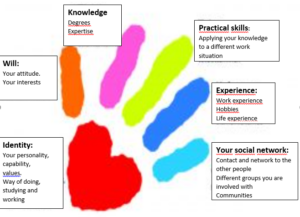4.1 Earning and proving your competence
PROFESSIONS:
-
Professions are divided according to different professional fields (ammatit) (Source: TE_palvelut/TE services website)
-
Every field includes many different professions
-
The different kind of knowledge and competence are needed in different professions
-
You may want to look at the competence and learning achievements in some professions from section: Digi material.
-
In education you will learn general work life skills (all of us need these) as well as core competence about the profession
-
A sufficient Finnish language skill is needed in order to be accepted in educational institutions.
To purchase competence:
-
You may gain more competence by participating in the education. Vocational education and training courses for that is possible to get from vocational institutes (upper secondary schools) and adult education colleges.
-
Higher education is possible to study in traditional academic universities and in more work life related universities of applied sciences. There is a dual higher education system in Finland
In Jyväskylä area there are following educational institutions:
Vocational institutions:
-
Gradia (Vocational school of Gradia)
-
Pohjoisen Keski-Suomen ammattioppilaitos (Northern Middle Finland vocational school)
-
Jyväskylän palvelualan oppilaitos (Jyväskylä college of services)
Adult education colleges and centers:
Higher education
It is possible to develop competence in everyday life too:
-
By participating in the different everyday situations will develop your competence. All the hobbies or interest will give you learning possibilities, which develop competence.
-
It is good to remember that knowing how to do the profession is always related to the product of learning and your life experiences.
-
It is important to know your own strengths. You can practice illustrating your competence by using the words which represent your knowing and skills in following assignment:
-
Competence words
Assignment 1:
-
Circle the things and characters following form where you are good at and what you are able to do successfully: (Words illustrating competence).
-
Make a cross on the word where you need to develop in order to get a job which you are interested in.
Assignment 2: It is possible to learn from your own life experiences, everyday life or hobbies.
-
Where do you have your strengths and skills?
Assignment 3: Everyone has learned values and ways of doing things in his or her own culture.
-
Explain three values or good ways to do things which help you to manage life, study or work in a new country.
SHOWING AND INDICATING YOUR COMPETENCE
When seeking a job the employee will ask what you can do. You can show your competence with different ways
-
Formal documents: When accomplishing the education the student will get a certificate to prove that the person has all the knowledge and skills needed in profession tutkintotodistuksen (Certificate in Finnish language)
-
When you are at work you can get a work certificate or letter of reference työtodistuksen. (In Finnish language)
-
With the work certificate, you can proof your competence and skills, which you have earned by your work experience.
-
You can make a CV = Curriculum Vitae (resume). You can write down your competence, work experiences and education. This is called CV. In addition to CV you will proof your competence with formal documents. Persian CV Arabic CV
-
You can make your own folder of competences or develop a portfolio: Osaamiskansiossa eli portfoliossa: (Source: Papupaja diaries, Jekkus´s Blogi) In portfolio you will gather evidences about your competence (narratives, pictures about products you have made, videos etc.)
-
Using “competence hand” as a tool for practice to showing and explaining your skills: What kind of competence do you have mentioned in a competence hand:
-
Knowledge: Degrees, studies, the professionalism
-
Skills: Practical doing, experience of applying knowledge to practice, knowing how to accomplish the task
-
Experience: Work experience, hobbies, life experiences which improve your competence
-
Networks: Social contacts, groups you are involved in, associations and societies you are involved in.
-
Identity: Your own personal characters, which support your work, values, what are your personal ways to manage different work tasks.
-
Willingness: Your attitudes and interest
Material progressed
Material progressed
